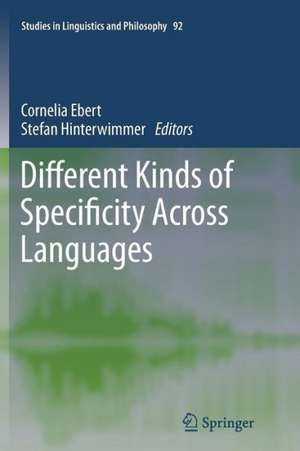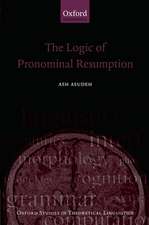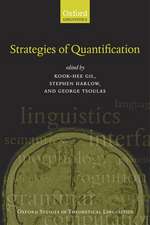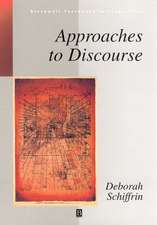Different Kinds of Specificity Across Languages: Studies in Linguistics and Philosophy, cartea 92
Editat de Cornelia Ebert, Stefan Hinterwimmeren Limba Engleză Paperback – 14 dec 2014
The papers explore differences and similarities among these specificity markers, concentrating on the following issues: whether specificity is a purely semantic or also a pragmatic notion; whether the contribution of specificity markers is located on the level of the at-issue content; whether some kind of speaker-listener asymmetry concerning the identification of the referent is involved; and the behavioral scope of these indefinites in the context of other quantifiers, negation, attitude verbs, and intensional/modal operators.
| Toate formatele și edițiile | Preț | Express |
|---|---|---|
| Paperback (1) | 778.10 lei 39-44 zile | |
| SPRINGER NETHERLANDS – 14 dec 2014 | 778.10 lei 39-44 zile | |
| Hardback (1) | 785.36 lei 39-44 zile | |
| SPRINGER NETHERLANDS – 9 noi 2012 | 785.36 lei 39-44 zile |
Din seria Studies in Linguistics and Philosophy
- 15%
 Preț: 583.78 lei
Preț: 583.78 lei - 18%
 Preț: 728.43 lei
Preț: 728.43 lei - 20%
 Preț: 1875.48 lei
Preț: 1875.48 lei -
 Preț: 393.35 lei
Preț: 393.35 lei - 18%
 Preț: 1224.68 lei
Preț: 1224.68 lei - 18%
 Preț: 733.78 lei
Preț: 733.78 lei - 20%
 Preț: 563.40 lei
Preț: 563.40 lei - 20%
 Preț: 509.79 lei
Preț: 509.79 lei - 15%
 Preț: 645.28 lei
Preț: 645.28 lei - 18%
 Preț: 723.69 lei
Preț: 723.69 lei - 18%
 Preț: 1552.05 lei
Preț: 1552.05 lei - 18%
 Preț: 953.65 lei
Preț: 953.65 lei - 15%
 Preț: 647.27 lei
Preț: 647.27 lei - 18%
 Preț: 959.98 lei
Preț: 959.98 lei - 18%
 Preț: 1832.39 lei
Preț: 1832.39 lei - 15%
 Preț: 646.30 lei
Preț: 646.30 lei - 18%
 Preț: 953.03 lei
Preț: 953.03 lei - 18%
 Preț: 1224.06 lei
Preț: 1224.06 lei - 18%
 Preț: 952.09 lei
Preț: 952.09 lei -
 Preț: 394.71 lei
Preț: 394.71 lei - 18%
 Preț: 942.01 lei
Preț: 942.01 lei - 18%
 Preț: 947.50 lei
Preț: 947.50 lei - 18%
 Preț: 955.70 lei
Preț: 955.70 lei - 18%
 Preț: 1223.43 lei
Preț: 1223.43 lei - 15%
 Preț: 653.00 lei
Preț: 653.00 lei - 15%
 Preț: 645.28 lei
Preț: 645.28 lei -
 Preț: 391.99 lei
Preț: 391.99 lei - 18%
 Preț: 942.01 lei
Preț: 942.01 lei
Preț: 778.10 lei
Preț vechi: 1023.82 lei
-24% Nou
Puncte Express: 1167
Preț estimativ în valută:
148.91€ • 155.26$ • 123.76£
148.91€ • 155.26$ • 123.76£
Carte tipărită la comandă
Livrare economică 17-22 martie
Preluare comenzi: 021 569.72.76
Specificații
ISBN-13: 9789401781411
ISBN-10: 9401781419
Pagini: 216
Ilustrații: VIII, 208 p.
Dimensiuni: 155 x 235 x 11 mm
Greutate: 0.31 kg
Ediția:2013
Editura: SPRINGER NETHERLANDS
Colecția Springer
Seria Studies in Linguistics and Philosophy
Locul publicării:Dordrecht, Netherlands
ISBN-10: 9401781419
Pagini: 216
Ilustrații: VIII, 208 p.
Dimensiuni: 155 x 235 x 11 mm
Greutate: 0.31 kg
Ediția:2013
Editura: SPRINGER NETHERLANDS
Colecția Springer
Seria Studies in Linguistics and Philosophy
Locul publicării:Dordrecht, Netherlands
Public țintă
Professional/practitionerCuprins
Introduction by Cornelia Ebert and Stefan Hinterwimmer .- Specificity Markers and Nominal Exclamatives in French by Fabienne Martin .- The Interpretation of the German Specificity Markers bestimmt and gewiss by Christian Ebert, Cornelia Ebert and Stefan Hinterwimmer .- Pragmatic Variation among Specificity Markers by Tania Ionin .- Certain Presuppositions and some Intermediate Readings, and Vice Versa by Igor Yanovich .- Exceptional Scope: The Case of Spanish by Luis Alonso-Ovalle and Paula Menéndez-Benito .- The Distribution of two Indefinite Articles – The Case of Uzbek by Klaus von Heusinger and Udo Klein .- Scenarios of Equivalence – The Case of quelque by Jacques Jayez and Lucia M. Tovena .
Textul de pe ultima copertă
This anthology of papers analyzes a range of specificity markers found in natural languages. It reflects the fact that despite intensive research into these markers, the vast differences between the markers across languages and even within single languages have been less acknowledged. Commonly regarded specific indefinites are by no means a homogenous class, and so this volume fills a gap in our understanding of the semantics and pragmatics of indefinites.
The papers explore differences and similarities among these specificity markers, concentrating on the following issues: whether specificity is a purely semantic or also a pragmatic notion; whether the contribution of specificity markers is located on the level of the at-issue content; whether some kind of speaker-listener asymmetry concerning the identification of the referent is involved; and the behavioral scope of these indefinites in the context of other quantifiers, negation, attitude verbs, and intensional/modaloperators.
The papers explore differences and similarities among these specificity markers, concentrating on the following issues: whether specificity is a purely semantic or also a pragmatic notion; whether the contribution of specificity markers is located on the level of the at-issue content; whether some kind of speaker-listener asymmetry concerning the identification of the referent is involved; and the behavioral scope of these indefinites in the context of other quantifiers, negation, attitude verbs, and intensional/modaloperators.
Caracteristici
Brings together empirical and theoretical research on specificity Presents for the first time an overview over the specificity markers found in natural languages Shows that specific indefinites are no homogeneous class, but one that comprises various sub-kinds Deepens our understanding of specificity by concentrating on the similarities and differences among specificity markers in different languages Enhances our understanding of the connection between specificity and topicality
















